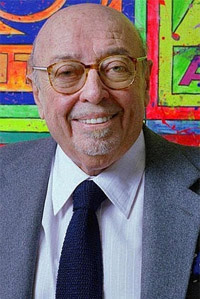"Ahmet would come in to a session and ask you if you wanted a pastrami sandwich. He’d order it from the Jewish deli, then start yakking in French on another phone. A pleasant Jewish man name of Wexler is cussing out a late drummer with some mighty greasy Lenox Avenue jive. Me, the black preacher, the apprentice mortician from Philadelphia, standing at the mike. Signing country and western. Now what would I call those years at Atlantic? Broadway fricassee."-Solomon Burke
 The news of Ahmet Ertegun’s death yesterday at the age of 83 is indeed sad news, and it is one of the few times when the phrase “the end of an era” rings true as opposed to feeling like hyperbole. But as I write this, listening to the Atlantic R&B 1947-1974 box set, I’m smiling. The man had an incredible life, a life worth celebrating. As much as any non-performer, he (along with his partner Jerry Wexler and their engineer non-pareil, Tom Dowd) was responsible for what r&b, soul (and as a result, rock) music became. As a record company head, producer and writer, Ertegun and Atlantic’s contribution to American music and culture was immense beyond measure. The artists speak for themselves: Ray Charles, Aretha Franklin, Solomon Burke, the Drifters, Donnie Hathaway, Wilson Pickett, Sam & Dave, Ben E. King, the Stax-Volt roster (including Otis Redding), Roberta Flack, the Spinners, Clarence Carter, Percy Sledge and more. In rock, there was Led Zeppelin, Eric Clapton, the Rolling Stones (from 1971-1984), Buffalo Springfield, CSNY, the Bee Gees, Yes and others. In Jazz (helmed by his brother Nesuhi) there was John Coltrane, Ornette Coleman, Charles Mingus, Milt Jackson, the Modern Jazz Quartet, Herbie Mann and Les McCann. Never before (or since) has a label had such a wide ranging, tasteful, financially successful and culturally significant roster.
The news of Ahmet Ertegun’s death yesterday at the age of 83 is indeed sad news, and it is one of the few times when the phrase “the end of an era” rings true as opposed to feeling like hyperbole. But as I write this, listening to the Atlantic R&B 1947-1974 box set, I’m smiling. The man had an incredible life, a life worth celebrating. As much as any non-performer, he (along with his partner Jerry Wexler and their engineer non-pareil, Tom Dowd) was responsible for what r&b, soul (and as a result, rock) music became. As a record company head, producer and writer, Ertegun and Atlantic’s contribution to American music and culture was immense beyond measure. The artists speak for themselves: Ray Charles, Aretha Franklin, Solomon Burke, the Drifters, Donnie Hathaway, Wilson Pickett, Sam & Dave, Ben E. King, the Stax-Volt roster (including Otis Redding), Roberta Flack, the Spinners, Clarence Carter, Percy Sledge and more. In rock, there was Led Zeppelin, Eric Clapton, the Rolling Stones (from 1971-1984), Buffalo Springfield, CSNY, the Bee Gees, Yes and others. In Jazz (helmed by his brother Nesuhi) there was John Coltrane, Ornette Coleman, Charles Mingus, Milt Jackson, the Modern Jazz Quartet, Herbie Mann and Les McCann. Never before (or since) has a label had such a wide ranging, tasteful, financially successful and culturally significant roster.Much of that success was due to Ertegun, because of who he was. The son of a diplomat and someone whose infatuation of music was begun by seeing Duke Ellington at the age of nine, he was equally at home at the swankiest society party and at the most low down juke joint in the south – and it was that combination of high and low, urbane and profane, uptown and downtown that when it was at it’s peak, was Atlantic’s hallmark. Atlantic also showed that great taste and shrewd business were not mutually exclusive propositions.
It was Ertegun who began using the term “soul” itself, to classify the music being made; being a jazz hound, he found the term adopted by black jazz musicians in New York, as a backlash against some of the snobbery of musicianship that in their mind, made jazz somehow less black. Atlantic lead the pack in the categorization of the music, with Ray Charles titles like, “A Bit Of Soul” (1955) and “Hornful of Soul” (1956). As Ertegun recounted to Gerri Hershey in her great early 80's book about soul, Nowhere To Run about the genesis of the title of the Milt Jackson/Ray Charles collaboration Soul Brothers (1957),
“We called it Soul Brothers but I wasn’t thinking so much of the notion it conjures today. ‘Soul Brother’ wasn’t part of the language then. But in Turkey (Ertegun’s native country) we have this concept. People who become very good friends declare one another brothers or sisters in the hereafter. They call themselves soul brothers or soul sisters. It’s a Turkish Muslim phrase. And I thought that it would be a groovy thing, since they dug one another so much, to call the album Soul Brothers. But it’s accidental.”A Turkish phrase to classify the most American of music - that typified Atlantic in it’s heyday; a melding together of people of various backgrounds - Turks, blacks, jews and southern whites, that created something so powerful and so resonant that it has become an essential part world's cultural fabric. A life that will be remembered and celebrated as long as Atlantic's best music is played. And as a music lover, listener, participant and executive who life has been enriched and given direction to by the music that he was involved in creating and then inspiring, all I can say is; Ahmet, thank you.
Download: Aretha Franklin: "Drown In My Own Tears"






1 comment:
Do you need some soul??? www.stephjohnsonband.com
Post a Comment